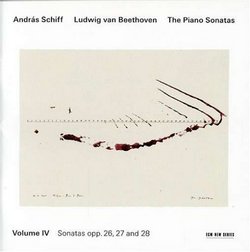Schiff's Beethoven series continues in superb fashion
Joe Murray | New York, NY USA | 05/27/2008
(5 out of 5 stars)
"Andras Schiff is releasing a complete cycle of the Beethoven 32 piano sontats. This is Volume 4, featuring three of his better-known symphonies (The Op 26 "Funeral March", the Op 27 No 2 "Moonlight, and the Op 28 "Pastoral"). The sonata which steals the thunder is the Op 27 No 1 (the first of the sonatas "quasi una Fantasia").
All four sonatas are impeccably played. Schiff uses a minimum of damper pedal. He also picks up the tempo of the famous "Moonlight" first movement, while sustaining the damper pedal (at half-pedal, I think) for what seems to be the entire movement. It's a stunning effect.
I might also recommend the Schiff lectures on the 32 sonatas - check out the Guardian UK website - [...] - who generously posted the 32 lectures (delivered over two years at Wigmore Hall) on their website for free! The Schiff series is a must-have for Beethoven collectors. The performances are live and have an intensity and a flow that can be lacking in studio recordings. Schiff is a master architect, and he knows every crevice of these pieces. If you haven't discovered Schiff's Beethoven yet, this is a perfect introduction."
András Schiff defines Beethoven's piano sonatas
Scaffa | Sweden | 01/05/2009
(5 out of 5 stars)
"This review refers to the eight volumes of András Schiff's cycle of Beethoven's piano sonatas released by ECM Records. The lay out of the volumes is as follows:
Vol 1: opp. 2 and 7
Vol 2: opp. 10 and 13
Vol 3: opp. 49, 14 and 22
Vol 4: opp. 26, 27 and 28
Vol 5: opp. 31 and 53
Vol 6: opp. 54, 57, 78, 79 and 81a
Vol 7: opp. 90, 101 and 106
Vol 8: opp. 109, 110 and 111
All recordings except those on the last volume are of live performances (from 2004 to 2006) in the Tonhalle Zurich in front of a very quiet audience. No coughing between movements, no applause at the end, and hardly any noise at all during performances. The last volume was recorded in the empty hall of the Reitstadel in Neumarkt, Germany. The sound quality is superb throughout. The separation of the channels is done so that you have the higher notes, located on the right hand side of the keyboard, in the right channel, and the lower notes in the left channel. Personally I find this the only acceptable way of organising piano music into a stereo recording. It gives you the impression of sitting in with the pianist.
Schiff's performances are of the highest order. He even manages to breathe new life into often-heard sonatas such as the Op 27-2, Moonlight. Pianists have not been able to agree on how to interpret Beethoven's instructions for the first movement of the Moonlight. Some, including Schiff, take Beethoven literally and push down the pedal for the entire movement (this and many other things is explained by Schiff in his Wigmore Hall lectures which are available for free download from the Guardian website). Gulda did the same in his 1950s cycle but not in his 1960s cycle. The result is mesmerising and beautiful. In addition, Schiff plays the Moonlight sonata at a slightly faster speed than what is commonly done, which makes for a fresh and contemporary take on this well-known piece.
No single cycle will probably satisfy you completely. I find much of Barenboim's playing on his 1960s cycle very odd but his performance of the Hammerklavier would follow me to a desert island. Gulda's 1960s cycle is mostly excellent (as is the sound, but one has to accentuate 'mostly' here because there are some awkward splices) but I can't think of any better way of starting your exploration of these magnificent works than by listening to Schiff's cycle. He has a sublime touch, a masterly control over his means and an artistic sensibility that will convince you that this is how Beethoven should be played. And it's all rendered in glorious sound. Highly recommendable.
"


 Track Listings (15) - Disc #1
Track Listings (15) - Disc #1